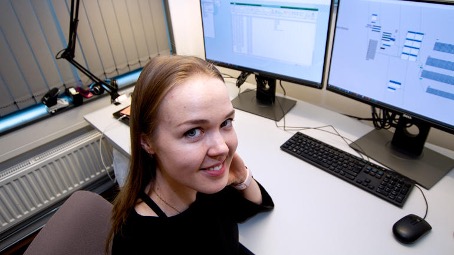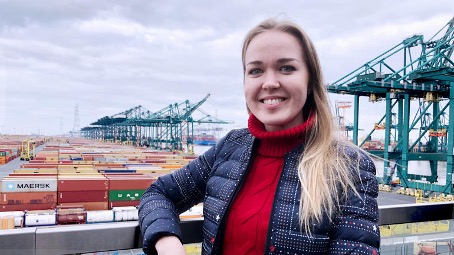Food, electronics, clothes and other imported goods have the smallest environmental footprint when brought to Norway by sea. At the same time the shipping industry must contribute with their share to reduce climate emissions globally, as well as nationally. This is the core of the research project Ecoprodigi – to bring environmental efficiency and digitalisation to the maritime industry. As the only Norwegian partner, the University of South-Eastern Norway contributed to the results of the EU-funded project.
In particular, the PhD-topic of Mariia Dushenko has played an important role. Her research is on how to make operations in port terminals more sustainable.
Laboratory for digital experiments

Ecoprodigi has had the status of a flagship-project in the EU strategy for the Baltic Sea. More than twenty participants from Norway, Sweden, Denmark, Estonia, Latvia, Lithuania, Poland, Belarus, Germany, Russia and the project coordinator in Finland have taken part in the project.
The project has uncovered potential improvements along the entire maritime value chain. The partners have developed and tested digital solutions for better surveillance, visualisation and optimalisation of industry processes. In addition the project has provided a valuable knowledge base for cost-effective and green measures in maritime industrial processes.
Dushenko is originally from Ukraine and has a master degree in finance and a master degree in maritime management. At USN she is currently undertaking a PhD degree in Nautical Operations and expects to finish in 2023.
The 31-year-old conducts research on planning and management of loading and unloading of ro-ro ships (roll-on–roll-off). These are ships with cargo such as light- and heavy duty vehicles, equipment, machines, containers and more. “By minimising the time the ship spends in the port, it will allow the ship to travel at a slower speed at sea, thus reducing the fuel consumption and emissions”, Dushenko explains.
In her Ph.D work she has developed a discreet simulation model for digital experiments and test of new methods for planning and management. “The model works as a laboratory where we can see the effect of the simulation in seconds. It is reliable, effective and visual. We test different factors for handling loading operations that may reduce the environmental impact of shipping”, Dushenko says.
One of the things she is looking at is to unload one unit from the ship and load another, so the tractors in the port is used to its fullest effect. She has also studied new ship designs, port terminal designs, as well as used algorithms on how to minimise the holding of ballast water, which is weight that ensures good stability of the ship.
Even if the focus area of Ecoprodigi is the Baltic Sea, the methods can be used anywhere. Development of teaching materials and training has also been an important part of the project. “The Baltic Sea is among the most heavily trafficked and most vulnerable areas in the world. Shipping is heavily regulated in the region and the industry is under pressure to meet the environmental demands and an increasingly global competition”, says professor Kenn Steger-Jensen, who is the project manager at USN in Ecoprodigi and the main supervisor for Mariia Dushenko’s PhD work.
Important cooperation for innovation
Steger-Jensen has been involved in developing a training programme and courses, alongside assistant professors Per Haavardtun and Per Eirik Undheim at the department of maritime operations. All three are educated as ship officers and have several years of experience at sea. In the autumn of 2018 Dushenko joined the project as a PhD candidate.
“The idea is to incorporate digital solutions to a larger degree than today, both in maritime industry and in teaching to reduce costs and environmental impact of the transport sector. Mariias simulation model for port terminals and logistics will give the students better learning outcomes from their training. We have also developed training modules to cover the future skills needs”, says Haavardtun.
“A challenge is that the competition in the maritime sector is in savings, not climate, but changes are coming. Therefore we have looked at how new digital solutions can make ships more energy-efficient and to reduce pollution, while at the same time ensuring the global competitiveness of the industry” says Steger-Jensen.
He points to the fact that even though the vessels need large amounts of fuel, the huge loading capacity means lower emissions than other alternatives. “Ecoprodigi has demonstrated the importance of cooperation between research, industry and decision-makers to develop and promote new technology and new solutions”, says Steger-Jensen.
About Ecoprodigi
- The research project Bringing eco-efficiency and digitalisation to maritime industry (Ecoprodigi) has in the period 2017-2020 been a cooperation between higher education institutions and maritime industries through the Interreg.noprogramme
- The University of South-Eastern Norway has represented Norway in the project. The other partner countries have been Sweden, Denmark, Estonia, Latvia, Lithuania, Poland, Belarus, Germany, Russia and the project coordinator in Finland.
- The project has looked at three main areas that will allow ships to sail slower, more environmentally-friendly and cost-effective: optimalisation of fuel usage, storage and goods/reducing time spent in ports and external processes in the ship yards industry.
Some of the results of the project
- New digital tools and new technologies that can reduce fuel use and emissions by up to 20 percent, while the productivity and efficiency in the processes increase.
- Development and new logistical shipping concepts involving ro-ro ships (roll-on-roll-off-skip) integrated in an intermodal transport system.
- Development of new principles for planning and managing loading and unloading from ro-ro ships.
- Training modules that will cover future skills needs in the area of digital tools and solutions for the maritime industry.
- A separate digital roadmap for sustainable measures.
- Courses in eco-efficient measures for leading maritime players.
- Workshops and exchange of experiences with authorities and decision-makers.
- Research in green, digital and autonomous shipping, green ports operations, ship design and more
- A Norwegian Centre of Excellence in Maritime Simulator Training and Assessment (COAST) contributing to the training of the










